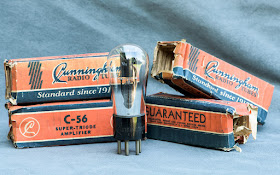The last two Tube of the Month posts covered the 27 and 37 which are the earliest indirectly heated small signal amplifier triodes in a long row of tube development. This month we see the third one, the 56.
In the 56 transconductance and amplification factor got increased over the 27. Therefor the old tube data books list it as 'Super-Triode'.
 Overall it is very similar to the 27, sharing the same UX5 base, pinout and physical dimensions. It also has the same 2.5V heater voltage. But the efficiency of the heater was significantly improved, consuming only 1A, almost only half of the 27s 1.75A. Transconductance and amplification factor both saw an increase of about 50% over the 27. Now with up to 1450 micromohs and a mu of 13.8. Typical plate currents and maximum plate voltage stayed the same. For complete technical data refer to the RCA data sheet. The 56 would drop into most circuits designed for the 27 without any or just some minor changes. A line stage for example could be designed to accept both. This way it is easy to boost gain by just changing the tubes. As expected they show a nice set of quite linear plate curves:
Overall it is very similar to the 27, sharing the same UX5 base, pinout and physical dimensions. It also has the same 2.5V heater voltage. But the efficiency of the heater was significantly improved, consuming only 1A, almost only half of the 27s 1.75A. Transconductance and amplification factor both saw an increase of about 50% over the 27. Now with up to 1450 micromohs and a mu of 13.8. Typical plate currents and maximum plate voltage stayed the same. For complete technical data refer to the RCA data sheet. The 56 would drop into most circuits designed for the 27 without any or just some minor changes. A line stage for example could be designed to accept both. This way it is easy to boost gain by just changing the tubes. As expected they show a nice set of quite linear plate curves:Real life curves from a tube sample look even better:
Here with a different setting of the grid step voltage:
Very nice set of evenly spaced curves.
Like the 37 the 56 was initially made in globe shape and later mainly in the ST 'coke bottle'. They never had the 3 digit designation with the UY-prefix like the UY227. Here some beautiful globe shape 56 from Cunningham:
The electrodes are fixed at the top with a small piece of mica:
Helix wound heater:
A cute little bulb!
A later version from Cunningham in the coke bottle shape:
Testable in box without taking the tube out:
The tube is floating in a carton inlay:
Cunningham 'C'-logo on the base:
Philco 56:
Crosley 56, made by Ken-Rad:
This one has very distinctive mica spacers in the top:
Never used 56 triodes made by Raytheon in perfectly sealed boxes:
Bottom of box:
For testing the tube can be pushed down:
The tube:
RCA 56:
The top with a large mica disc:
The base:
Close up to the plate structure:
Like the 27 and 37 all 56s have nice round plate structures. Cathode, grid and plate are concentrically arranged. The heater wire:
RCA Cunningham dual branded 56.
Globe RCA 56:
Tung Sol:
Due to the reduced heater power the 56 exhibits less visible glow than the 27, but a bit more than the 37:
Zooming in:
In some tube samples there is only a small glowing dot visible from the top:
Here a globe version in operation:
A different one:
The 56 is yet another almost forgotten triode which is very well suited for audio applications. As time permits I will develop a line stage for 27/56.
Stay tuned!
Best regards
Thomas

















































Wow, it's really cool to see that you're taking an interest in both the 27 and the 56. Dennis Had built me a preamp thbat can use both of those tubes, and I've had great fun with it and the matching 45 SET amp. I can't wait to see your design (and maybe pick one up, you can never have too much tube gear).
ReplyDeleteone of my favorite preamps is a custom type 27-now I must try some n.o.s national union 56 in there!
ReplyDeletethe 56 makes the 27 seem a little sad,...in my opinion!
ReplyDeleteWhy is that?
DeleteMy Dennis Had LP-27a preamp uses bothe the 27 and 56. I’ve found that the best sounding 56 is tye Raytheon ER-56 4-pillar mesh plate. As far as I can tell, mesh plate 56’s are very rare. I’ve only seen one other mesh plate by FADA I believe.
ReplyDeleteMy Dennis Had LP-27a preamp uses bothe the 27 and 56. I’ve found that the best sounding 56 is tye Raytheon ER-56 4-pillar mesh plate. As far as I can tell, mesh plate 56’s are very rare. I’ve only seen one other mesh plate by FADA I believe.
ReplyDelete